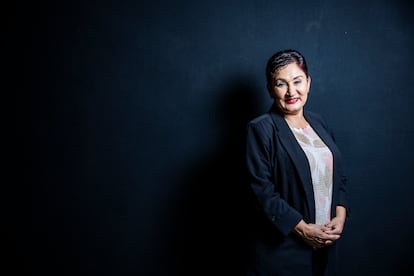Thelma Aldana, former Guatemalan prosecutor exiled in the US: ‘The best thing about Washington is falling asleep on the subway’
The ex-attorney general of Guatemala wants to return to her home country, where she is hopeful President-elect Bernardo Arévalo will take office in January

For the neighbors who cross her path every day, Thelma Aldana is just a Guatemalan woman living in an apartment in the U.S. capital and who works with migrants. But there is a lot more that they do not know about her. In 2018, Aldana was the attorney general of Guatemala and was investigating corruption when the threat of an attack drove her into exile. More than 40 high ranking lawyers like her have also had to flee their home country. Aldana, now 67 years old, has been invited to talk about democracy at the Centroamérica Cuenta (Central America Counts) Festival in Madrid, Spain.
Question. How do you live in exile?
Answer. In exile, you hit rock bottom as a human being: letting go of your family, your home, your friends, your country, your future, and your job leads to loneliness and anguish. The U.S. is a wonderful country, but English is an obstacle. If you add to that the criminalization and smear campaigns that continue to reach me... Consuelo Porras, the current attorney general, continues to attack us. There are 42 Guatemalan anti-corruption officials in exile, all persecuted by the corrupt in Guatemala. But you have to find the positives, try to be happy and find your inner strength in the same way you have felt hopelessness, fear, and uncertainty. It all goes into making you a better person in the end because you understand the reality of many people, like the four million Guatemalans who are in the United States. My challenge is to be happy and keep my chin up, I work toward that every day. I couldn’t even say goodbye to my children, who are 29 and 26 years old. It is very hard.
Q. Is there hope for Guatemala?
A. Sure. Right now we are hopeful that President-elect Arévalo will take office in January.
Q. But his party, Semilla, has been suspended.
A. We are experiencing a coup d’état in progress against the elected president and his party because he has upset the status quo. In Guatemala, they are used to stacking the deck every four years so that two like-minded people go to the second round. And this time, surprise! It was not what they had planned. That is why the [current] attorney general is directing the coup d’état.
Q. What, then, is your hope based on?
A. If the president-elect does not take office on January 14, it will be a failure for Guatemalan democracy, but also for Central America and the international community for not sufficiently supporting the will of the people expressed at the polls and in the streets in the face of the attack [on democracy] by the attorney general.
Q. Were you surprised by Arévalo's victory?
A. It was surprising, especially to see that his vote came [primarily] from 18 to 35-year-olds. The Guatemalan youth was informed. They voted, and they want Arévalo to take office. I love that young people have become aware of the country they live in. Semilla is a progressive movement that was born from the anti-corruption demonstrations in 2015, and that is what young people have supported.
Q. You have led many investigations against corruption in politics. Would you do it again?
A. Of course I would do it again, we didn’t have [enough] time! Despite everything it has cost me and my personal suffering, it was worth it.
Q. To what do you attribute the democratic regression that Central America is experiencing?
A. There is a general phenomenon of weakening the justice system. Corrupt actors are focused on this to ensure their impunity, and that is the big challenge. When the justice system sides with the corrupt, the people are defenseless. This is what I’m seeing in many countries.
Q. A few days ago, Lydia Cacho, a Mexican journalist (also in exile), told me that she has found strength through therapy. How do you manage to stay strong?
A. I got an alert from the DEA and I left for El Salvador. I arrived in the U.S. for an interview with CNN and never returned. I didn’t know I was going into exile, and I was lucky that some Guatemalan migrant friends took me to a church. The Bible was my therapy. I have read it from cover to cover every year of my exile. Every word. I read four or five pages a day, I meditate on it, and it has helped me a lot. I haven’t needed a psychologist. Jesus Christ is my psychologist, and he has helped me a lot.
Q. And to forgive?
A. I learned that in the Bible. To stay well, I must not have hatred in my heart, no matter what they do to me. I’m fine.
Q. What is your life in Washington like?
A. I live in a studio apartment. I have worked with WOLA (Washington Office for Latin American Affairs), I use the subway and the bus and I really enjoy it because in Guatemala we don’t have a subway, and you can’t get on the bus. I know the entire subway route from Washington, Virginia, and Maryland. I go to New York, I visit migrants… I try to live my daily life in peace.
Q. And what do you like most about it?
A. What I like is the institutionality. I admire countries like Spain or the United States that have institutions, freedom of expression, security, and so on. You can walk through the streets. In Guatemala, I went from my house to the car and from my car to home with secret service agents breathing down my neck. In Washington I fall asleep on the subway! On the journey home, we are all asleep or looking at our cell phones, and that’s a peace and security that I did not know.
Q. And yet you would return to Guatemala as soon as you could.
A. Sure! I have a job and a lot of credibility in Washington, but we all want to return. It’s hard to ignore the call back home.
Q. If you do manage to return, would you pick up where you left off, investigating corruption?
A. No. I would like to return to teaching. I taught at two universities, and that’s what I wanted to do after finishing as attorney general. I hope to do that when I return.
Sign up for our weekly newsletter to get more English-language news coverage from EL PAÍS USA Edition
Tu suscripción se está usando en otro dispositivo
¿Quieres añadir otro usuario a tu suscripción?
Si continúas leyendo en este dispositivo, no se podrá leer en el otro.
FlechaTu suscripción se está usando en otro dispositivo y solo puedes acceder a EL PAÍS desde un dispositivo a la vez.
Si quieres compartir tu cuenta, cambia tu suscripción a la modalidad Premium, así podrás añadir otro usuario. Cada uno accederá con su propia cuenta de email, lo que os permitirá personalizar vuestra experiencia en EL PAÍS.
¿Tienes una suscripción de empresa? Accede aquí para contratar más cuentas.
En el caso de no saber quién está usando tu cuenta, te recomendamos cambiar tu contraseña aquí.
Si decides continuar compartiendo tu cuenta, este mensaje se mostrará en tu dispositivo y en el de la otra persona que está usando tu cuenta de forma indefinida, afectando a tu experiencia de lectura. Puedes consultar aquí los términos y condiciones de la suscripción digital.









































